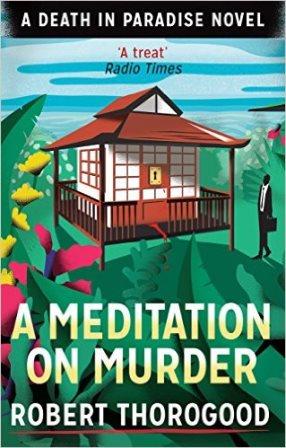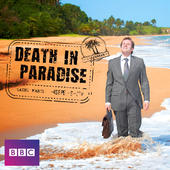
If you were going to kill someone, would you choose to do it in front of witnesses, and inside a locked room?
I don’t feel like I’m going out on a limb here when I say that, no, I don’t think you would. But then, if you were going to kill someone and even confess to committing such an odd murder, you’d probably have a motive, right? Right? Well, that just isn’t how murder operates on the tropical island of Saint-Marie.
Recently I read and LOVED Robert Thorogood’s ‘The Killing of Polly Carter’, so reading his previous novel, ‘A Meditation on Murder’, became a priority.
What’s it about?
Spiritual guru Aslan Kennedy runs The Retreat, a luxury hotel in the Carribbean offering holistic therapies, with his wife, Rianka. Each morning he wakes when the sun rises, (having rejected the crass enslavement of man’s invented minutes and hours several, er, years ago,) and leads a Sunrise Healing session with hand-picked hotel guests. On one otherwise typical morning, the Sunrise Healing session is interrupted by a scream, and Rianka runs towards the Meditation Space to find her husband brutally murdered, five bloody knife wounds in his back and five witnesses. Well, four witnesses and one hotel employee holding a bloodied knife while saying ‘I killed him.’ But – did she?
DI Richard Poole is the kind of detective other detectives don’t like. Or at least, that seems to be why he was despatched from the pleasant environs of Croydon and forced to swelter in the simply ridiculous heat of the Carribbean, where it’s hot for nine months of the year then hot and hurricaney for the remaining three. (‘Admittedly he’d collected empirical evidence that suggested that Saint-Marie was a popular holiday destination for tens of thousands of other people, but what did other people know?) Ignoring the searing heat as best he can – while remaining resolutely dressed in the increasingly sticky woollen suit he deems necessary for his position – Richard inspects the murder scene and quickly concludes that the one person who has confessed is the one person who could not possibly have killed Aslan. So who did? And why did a clearly premeditated murder take place in a building with so many witnesses?
DI Poole doesn’t know, but he’s going to find out, even if his colleagues look at him incredulously every time he mentions the word ‘drawing pin’.
What’s it like?
Disappointingly repetitive. You know those irritating TV voiceovers that remind you of information you were given about three minutes, or possibly even thirty seconds, earlier? ‘Steve is looking for an investment of 40,000 pounds in his dog grooming business Purr-fect Pets.’ Really? Gosh. Because when he asked for that amount just before the ad break I thought he was joking. ‘A Meditation on Murder’ is like that, but without the ad breaks. If a murder mystery’s good you settle in for the long haul, filling your largest tea mug to the brim and snuggling the whole packet of digestive biscuits down the side of the armchair just in case. You don’t wander off between every chapter to cook a three course meal and forget which character was originally found holding a bloodied kitchen knife over a dead body. Or maybe some people do. I don’t and I found the repetition intensely irritating.
I don’t remember ‘The Killing of Polly Carter’ feeling so repetitive, so perhaps the editing was tighter for the second book, or perhaps the way the plot developed meant that it felt more like events were moving toward a crescendo; here events ebb and flow without ever reaching a pinnacle of certainty until the end.
That complaint aside, this is very clever and a classic locked room mystery. The solution is tantalisingly solvable: the clues are all there – but, of course, so are the red herrings, and before long it’s clear that all the witnesses are withholding potentially relevant information, but while some appear to have motive and others appear to have opportunity, no one seems to have both, or do they? Something isn’t right and Richard is still convinced it’s connected to those drawing pins. After all, who has drawing pins in a room where people go barefoot?
A Death in Paradise Novel
Prior to reading Thorogood’s second novel I was completely unaware that the TV series ‘Death in Paradise’ existed. I doubt you’re as oblivious as me, but just in case you are, all you need to know is that it features some of the same characters as the books and in each episode the cast solve a murder mystery with a narrow and often impossible list of suspects. (Apparently DI Poole starred in the first series; there’s another DI now who seems equally inept with the ladies and the locals, so I don’t think much has changed.)

DI Poole in the Carribbean
Robert Thorogood is the writer of the TV and book series and the cover design is obviously designed to capitalise on the connection between the two. To be completely honest, I dislike it, especially the decision to pepper the back cover with pictures from the TV show rather than fitting in the book’s blurb. I’m interested in this story, not some show I’d never previously heard of. I understand the commercial logic, but as an avid crime reader, I would never have looked at this in a bookstore, let alone picked it up. My point? Don’t be put off: it’s much better than it looks. And having started tuning into series four, I’ve found the TV series is quite entertaining, too.
Final thoughts
This is classic cosy crime: plenty of suspects, plenty of twists, and a chatty denouement where DI Poole thoroughly outlines each of the potential perpetrator’s motives and opportunities before unveiling in great detail the true culprit’s motivations and means. If you enjoy that kind of tale then this is pretty much perfect. I’m just hoping that for the third book in the series Thorogood can avoid the lure of repeatedly pointing out the significance of something we already know to be significant. It’s bad enough TV’s like that; if you genuinely want or need a recap when reading, you can simply turn back to the previous page(s). Such is the joy of reading.*
I’m still looking forward to DI Poole’s next outing, and in the meantime will continue to enjoy** the TV show.
‘A Meditation on Murder’,
Robert Thorogood,
2015, Harlequin Mira, paperback
* Of course, this is trickier when reading on a mobile or other electronic device, which is one of the many reasons I still prefer printed books.
** I have my moments of pure frustration with the TV series too, but I’m well-practised in complaining at the TV and my husband is well-practised at saying ‘Stop it!’ He’s all about the fun and, apparently, a spot of mind-numbingly obvious build-up or awkward tomfoolery doesn’t spoil The Fun. Hmm.